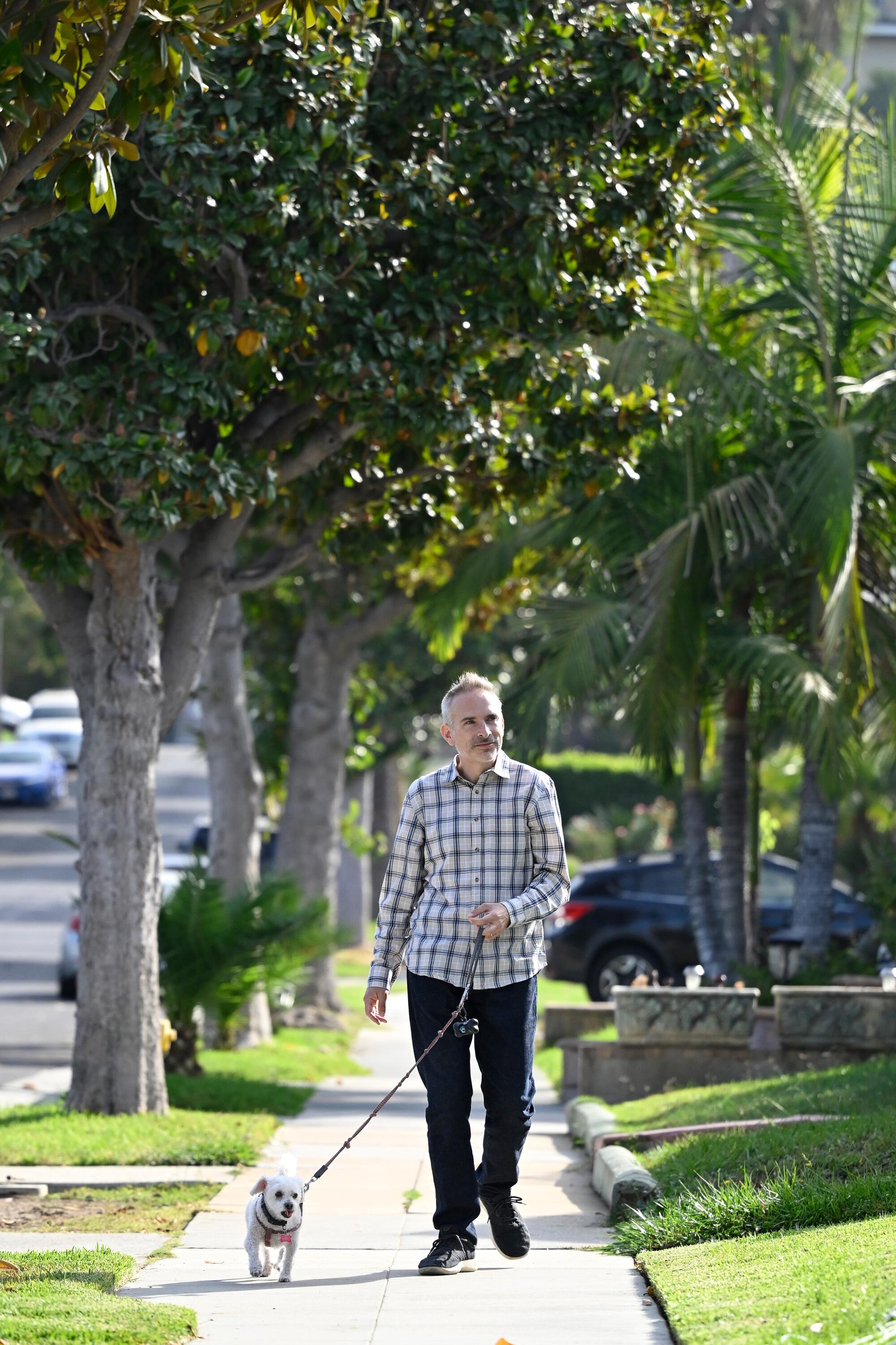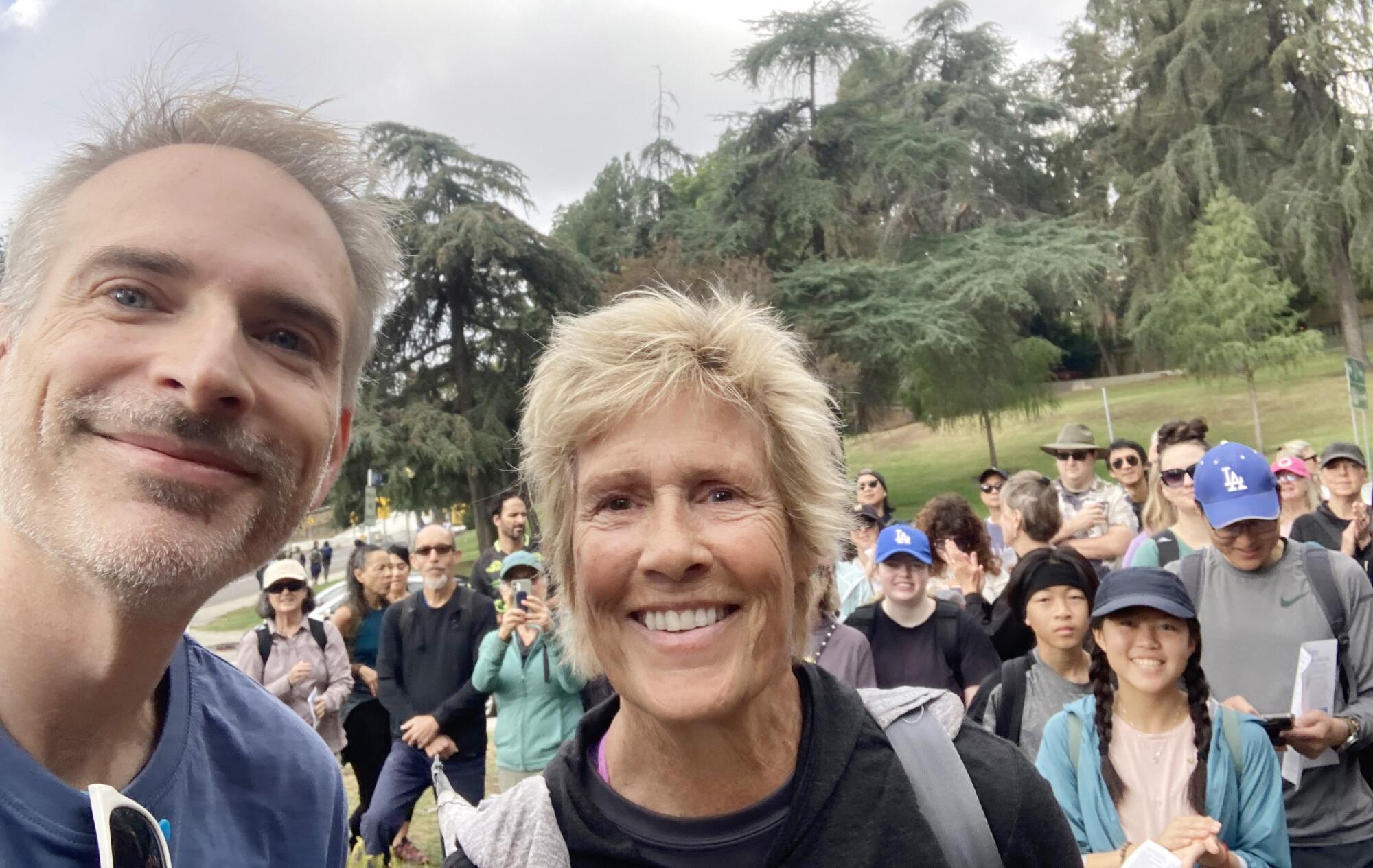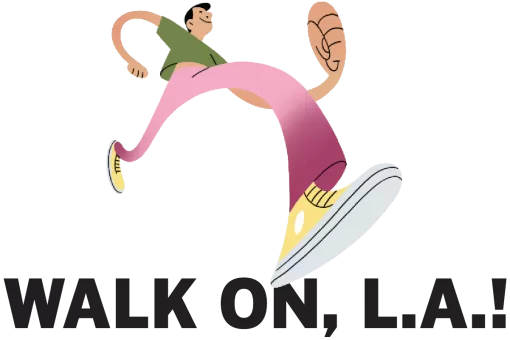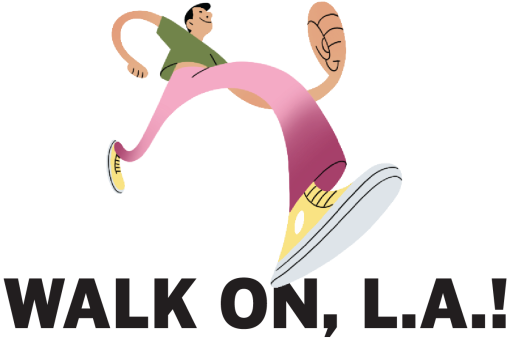The morning I meet Michael Schneider at a quaint coffee shop in Glendale, it quickly becomes clear that he walked here. His sneakers are the first clue — worn, white Nike trainers smudged with dirt. It’s uncharacteristically warm out this morning and his sweat-speckled forehead offers the second clue. His lean, exercised frame cinches my suspicion.
“I’ve probably walked more than 10,000 steps already today,” he tells me proudly, checking the health data on his phone to be sure — and it’s only 10:30 a.m.
In a city built for cars, Schneider is committed to exploring the city on foot, often heading out from his Adams Hill home at 11 p.m., in the dark, to get his steps in after the day’s work is done. In fact, over the last two decades, Schneider, 51, has traversed the length of Los Angeles on foot 18 times, covering nearly 300 miles in all during those journeys. But he didn’t do it alone.
Schneider is the founder of the Great Los Angeles Walk, an annual citywide event he started in 2006 to mark his 10th anniversary of moving to the city from Chicago. What began as a DIY, mobile celebration of L.A. — with just his wife, a handful of friends and several dozen readers of his blog, Franklin Avenue — has morphed into a local tradition, drawing up to 500 participants every November on the Saturday before Thanksgiving. Each walk spans the length of an iconic L.A. boulevard, trekking about 14 to 16 miles and stopping along the way to explore its sun-scorched sidewalks and faded public murals, its high-end furniture boutiques, cheap motels and historic churches, its food carts piled high with fresh fruit and its buzzing freeway overpasses — from below.
The very first Great Walk, inspired by journalist Kevin Roderick’s 2005 book, “Wilshire Boulevard: Grand Concourse of Los Angeles,” had participants hoofing the entire 15-plus miles of Wilshire, from downtown L.A. to the ocean. The only marketing Schneider did for the event was a simple blog post announcing the trek. About 40 people attended.
“It was almost a lark,” says Schneider, the television editor at trade publication Variety. “I had no idea how many people would show up.”
The second walk, which drew 100 people, took place on Pico Boulevard, inspired by Times food critic Jonathan Gold, who famously ate his way down the street in his early 20s. Gold emailed Schneider food-stop recommendations at the time. The event has since tackled Santa Monica Boulevard, Beverly Boulevard, Melrose Avenue, Sunset Boulevard and Hollywood Boulevard, among many others.
On top of being a terrific pre-holiday workout, the Great Walk debunks the ever-persistent beliefs that L.A. is not a walking city and that its physical sprawl impedes the ability to build community. Scores of individuals have met during the Great Walk, including Westwood residents Cat and Steve Whalen, who ended up getting married in 2023. They still do the walk every year.
“I remember bonding over the architecture of this old Public Storage facility,” Cat Whalen said of meeting her husband in 2016. “It’s an event that combines our love of walking and urban landscapes and architecture — and, of course, there’s the social component.”
Over the years, participants have ranged from stroller-bound babies to residents in their late 80s. Attendees arrive alone or with a community group. Since 2017, long-distance swimmer Diana Nyad has come with members of her EverWalk nonprofit, which encourages walking for health and human connection. Walkers have traveled from as far as Amsterdam and Japan to join the festivities; one man journeys from Santa Fe, N.M., every year to participate — barefoot. He’s become part of the colorful fabric of the event.
“I always run into him about midway through the walk,” Schneider says. “He’s got his camera and he’s barefoot. That’s just what he does.”

Michael Schneider with his dog, Jacks. Schneider founded the Great Los Angeles Walk in 2006.
(Robert Hanashiro/For The Times)
The Great Walk has been covered by local blogs, television stations and newspapers, including The Times. But less has been written about Schneider himself, who has amassed nearly 20 years’ worth of looky-loo knowledge while strolling through the peaks and valleys of the city.
Sitting at the coffee shop, Schneider looks every bit the suburban dad. He wears a trim salt-and-pepper goatee and a zip-up hoodie, and takes every opportunity to boast about his two sons, 19 and 15, who have joined the walk nearly every year of their lives. His eldest first took part at age 1½ and his youngest at 3 months old.
But Schneider’s normcore exterior belies an undercurrent of intensity: There’s a particular, obsessive mindset required to conceive of and execute such an ambitious public expedition every year over two decades. (The Great Walk even continued during the pandemic.) Not to mention chronicling those journeys in detailed blog posts, which are meticulously archived online. It requires a passion for cities, urban history and, perhaps, cartography; an affinity for architecture and urban design; a love of community; and a knack for numbers. During our interview, Schneider repeatedly referred to stats from his Noom weight-loss app, his cornflower blue eyes glimmering as he spoke of caloric intake versus exercise expenditure in steps and miles.
In sum, he’s a collector. Of miles and health stats, of vinyl records, of books about L.A. — and of people. He first developed the habit as an “Air Force brat” kid growing up, moving with his family between the Philippines, Oklahoma and Hawaii, when he began obsessively accumulating information about the television business.
“I was that kid, at 7, who knew who Ted Turner was,” Schneider says, chuckling. “I collected TV Guides from whatever city we’d travel through on vacation.”
After college at Northwestern and a year working between Chicago and Washington, D.C., Schneider moved to L.A. in 1996 with the TV trade publication Electronic Media. In ’99, he landed a job as a reporter at Variety and met his wife, Maria. He wasn’t much of an exerciser, but she liked to walk. Their early dates were spent exploring the city on foot, including taking Los Angeles Conservancy walking tours downtown and hiking in Griffith Park. Schneider fell in love with L.A. history and found that walking its concrete stretches helped him feel more rooted in the city.
“When I first came to L.A., I was like: Where is the core?” he says. “I didn’t understand why people didn’t know where to congregate. Now I get it. It’s all these different cores.”
Schneider also has collected handfuls of odd, serendipitous moments from the Great Walk. The event has passed weddings in progress, film crews shooting, even buildings on fire. Once, in 2009, the group streamed past the Nate Holden Performing Arts Center on Washington Boulevard and Magic Johnson appeared in the window to cheer them on. Two years earlier, on Pico Boulevard, a crane holding a billboard toppled over and chaos ensued.
“Traffic stopped, police were everywhere, no one could get through,” Schneider recalls. “But here we were, just walking on by.”
Schneider doesn’t make any money off of the Great Walk; it’s free to participants and he doesn’t pay to advertise the event. In recent years, there have been sponsors, including The Times, who might give him free ads, say, or pass out water in exchange for a mention on the blog.
“But there’s no business model,” Schneider says. “We’re not an official organization. This is just a grassroots group of people getting together to walk.”
Nineteen years of crisscrossing L.A. on foot has given Schneider a rare, bird’s-eye-view of the city, from a boots-on-the-ground perspective. And he’s had to alter the walk as the city around it has morphed.
“In recent years, obviously, there’s been a lot more homelessness on the streets, along with more trash,” he says. “So I’ve been mindful of trying to choose streets where it’s less of an issue.”
The city’s construction boom also has been particularly noticeable, he says.
“Just the amount of change that we’ve seen in recent years in development — that’s a positive. More housing, more buildings. But it’s also sad when you walk by and that historic building, like the Ambassador [Hotel], is no longer there — that’s a negative,” he says.
Schneider kicks off each Great Walk at a landmark, such as Walt Disney Concert Hall, the Shrine Auditorium or the Exposition Park Rose Garden, where there’s typically a guest speaker giving a pep talk. Roderick and Nyad have taken the megaphone, as have performer-urban explorer Charles Phoenix and journalist-historic preservationist Chris Nichols. And there’s always an “afterparty” at a venue near the finish line.

2023 photo of Michael Schneider with long-distance swimmer Diana Nyad.
(Michael Schneider)
This year’s walk will pay homage to Schneider’s family. He has one son at UCLA and a nephew at USC. So the walk will start downtown at the Los Angeles Memorial Coliseum in Exposition Park near USC’s campus and end on UCLA’s campus at the Bruin Statue. Between those points, the 14.2-mile trek will traverse parts of Vermont Avenue, Washington Boulevard, Culver Boulevard, Overland Avenue, Pico Boulevard and Westwood Boulevard.
“It just so happens, in recent years, that Saturday before Thanksgiving is the day of the USC-UCLA game,” Schneider says. “I was like: OK, this is too good. We have to do it.”
Where will the Great Walk take place next year, for its milestone 20th anniversary?
“Back to Wilshire,” Schneider says without pause. “It’s gonna have to be the OG.”
While the Great L.A. Walk may be associated with exercise, Schnieder repeatedly reminds participants that the goal is to go slow.
“It’s about taking your time,” he says. “Go into a store you’ve never seen, take the time to look at a sculpture, stop at that church. The key is to feel like you’ve learned more about Los Angeles. I still learn things. I still see things I’ve never seen before.”
When our conversation ends, Schneider does what he’s always done. He heads out the door and starts walking.


